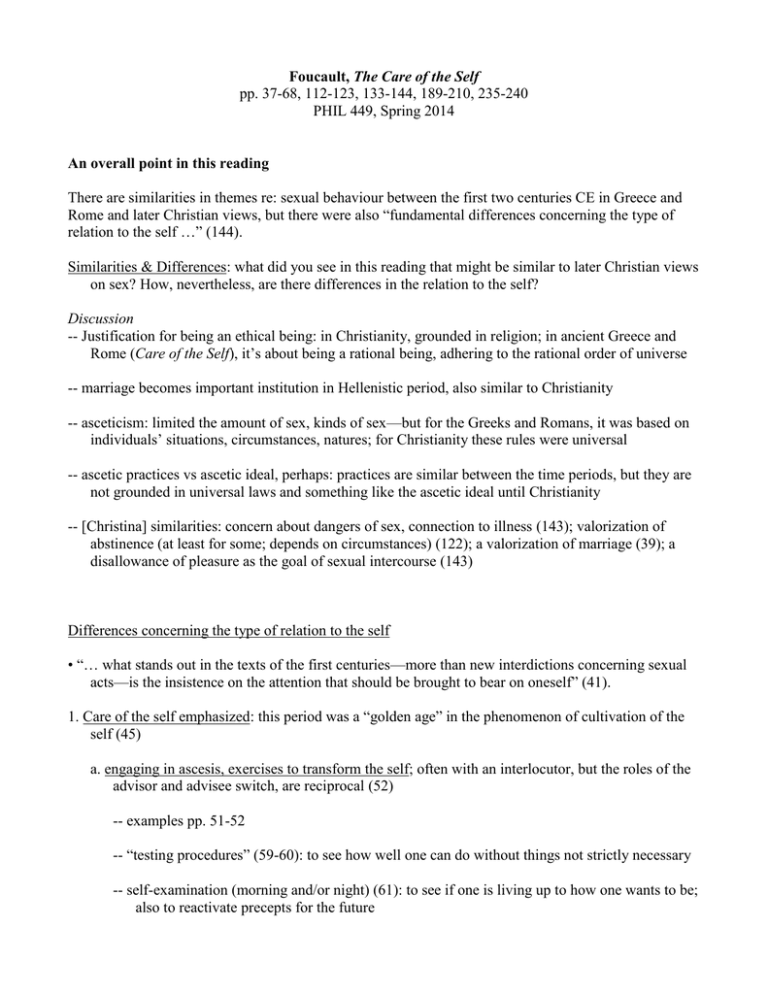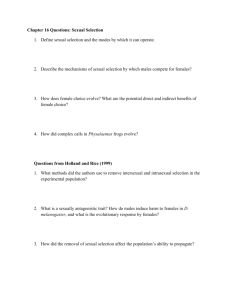
Foucault, The Care of the Self
pp. 37-68, 112-123, 133-144, 189-210, 235-240
PHIL 449, Spring 2014
An overall point in this reading
There are similarities in themes re: sexual behaviour between the first two centuries CE in Greece and
Rome and later Christian views, but there were also “fundamental differences concerning the type of
relation to the self …” (144).
Similarities & Differences: what did you see in this reading that might be similar to later Christian views
on sex? How, nevertheless, are there differences in the relation to the self?
Discussion
-- Justification for being an ethical being: in Christianity, grounded in religion; in ancient Greece and
Rome (Care of the Self), it’s about being a rational being, adhering to the rational order of universe
-- marriage becomes important institution in Hellenistic period, also similar to Christianity
-- asceticism: limited the amount of sex, kinds of sex—but for the Greeks and Romans, it was based on
individuals’ situations, circumstances, natures; for Christianity these rules were universal
-- ascetic practices vs ascetic ideal, perhaps: practices are similar between the time periods, but they are
not grounded in universal laws and something like the ascetic ideal until Christianity
-- [Christina] similarities: concern about dangers of sex, connection to illness (143); valorization of
abstinence (at least for some; depends on circumstances) (122); a valorization of marriage (39); a
disallowance of pleasure as the goal of sexual intercourse (143)
Differences concerning the type of relation to the self
• “… what stands out in the texts of the first centuries—more than new interdictions concerning sexual
acts—is the insistence on the attention that should be brought to bear on oneself” (41).
1. Care of the self emphasized: this period was a “golden age” in the phenomenon of cultivation of the
self (45)
a. engaging in ascesis, exercises to transform the self; often with an interlocutor, but the roles of the
advisor and advisee switch, are reciprocal (52)
-- examples pp. 51-52
-- “testing procedures” (59-60): to see how well one can do without things not strictly necessary
-- self-examination (morning and/or night) (61): to see if one is living up to how one wants to be;
also to reactivate precepts for the future
-- examination of thoughts (63-64): e.g., to determine whether our desires and aversions attach to
things that are or are not under out control
b. goal of these procedures: “conversion to self” (64) through freedom from external things not
dependent on the self (this is an important theme in Epicureanism and Stoicism)
-- one “’belongs to himself,’ one is ‘his own master’ … one is answerable only to oneself ….”
(65)
2. Some of these look similar to self-examination & self-knowledge in Christianity and even modern
confessional practices
a. e.g., morning & evening self-examination: but this was not for the sake of self-castigation, or
finding oneself guilty like a judge, or to spark a feeling of remorse (62)
-- the point is to further implant principles in the self so one acts on them better in the future (61)
b. e.g., examination of thoughts: “a steady screening of representations: examining them, monitoring
them, sorting them out” (63)
-- similar to HS1 and religious confession: “’Examine diligently … all the faculties of your soul:
memory, understanding, and will. Examine with precision all your senses as well. … Examine,
moreover, all your thoughts, every word you speak, and all your actions. Examine even unto
your dreams …’” (HS1 20).
-- but during first two centuries CE, self-examination is not for the sake of inquiring into “the deep
origin of the idea that presents itself; it is not to try and decipher a meaning hidden beneath the
visible representation” (CS 64)
-- rather, it is in order to recognize the relationship between the self and the thing represented—
whether the thing depends on the self or not, and thus whether we should have desire or aversion
towards it (64)
3. Sexual abstinence considered healthy generally, because it means retaining sperm—something both
men and women have that “contributes to ‘health, strength, courage, and generation’” (112, quoting
Aretaeus)
-- but still, for some it can be harmful, depending on their particular nature and circumstances;
sexual activity can at times be therapeutic (118-119)
-- “Sexual abstinence was not regarded as a duty, certainly, nor was the sexual act represented as an
evil” (122).
4. “pathologization” of sex (141)—similar in some ways to later views
a. HS1, p. 65: sexual behaviour dangerous, linked to illness: “there was scarcely a malady or
physical disturbance to which the nineteenth century did not impute at least some degree of
sexual etiology” (65)
b. HS3, p. 117: “The list of ailments, malaises, and diseases that can be engendered by the sexual
pleasures if one commits a deviation, with respect either to time or measure, is virtually open.”
c. specific problems re: sex & the body, soul
(i). involuntary and continuous tension (e.g., priapism); related to epilepsy (113-14)
-- can be b/c one has suddenly stopped sexual activity and has too much sperm
(ii). involuntary discharge of sperm w/o arousal: in men, this can lead to “a general loss of
strength, premature aging, and a feminization of the body” (115).
(iii). sexual desires in soul shouldn’t go beyond the needs of the body; engage in sex for the sake
of discharging physiological needs (134-136)—this in order to adhere to the rationality of the
natural order (135)
-- don’t think of the pleasure of the act as the reason for doing it, but just a natural
accompaniment, lest you let pleasure drive you to excess of sexual activity (139)
-- don’t indulge in erotic ideas, representations, images (136-138)—those who do can suffer
from priapism or have other physiological problems with genitals (137)
d. but this pathologization did not “delimit the ‘pathological’ forms of sexual behavior; rather, it
uncovered, at the root of sexual acts, an element of passivity that was also a source of illness,
according to the double meaning of the word pathos” (142).
-- see discussion of pathos p. 54
5. In this period one pays close attention to sex,
a. “But this attention does not lead to a decipherment of that activity in its origin and unfolding; it is
not a matter of the subject’s knowing precisely how things are with his own desire, with the
movements that lead him to the sexual act, with the choices he makes, with the forms of acts he
commits or the modes of pleasure he experiences” (142)
-- One must “address a discourse of ‘truth’ to himself. But this discourse does not have the
function of telling the subject the truth about himself …” (142-143).
b. rather, the focus here is on preserving health, adhering to the natural order of the body





